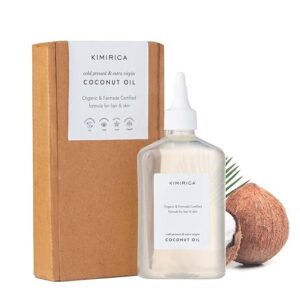Coconut Oil for Face: Benefits and Precautions
Page Contents
- Coconut Oil for Face: Benefits and Precautions
- Coconut Oil for Glowing Skin
- Coconut Oil for Skin Whitening
- Coconut Oil Massage Benefits for Face
- What Happens If You Apply Coconut Oil on Your Face Overnight
- Is Coconut Oil Good for Your Face?
- Benefits of Coconut Oil on Skin Everyday
- Side Effects of Applying Coconut Oil on Face Overnight
- Precautions When Using Virgin Coconut Oil on Face
- How to Use Coconut Oil on Your Face
- Benefits of Applying Coconut Oil on Face Overnight
- Disadvantages of Applying Coconut Oil on Your Face
- Frequently Asked Questions
Coconut oil has become a popular natural skin care ingredient in recent years due to its many purported benefits for skin and hair. When applied topically, coconut oil can provide moisturization, fight microbes, and improve skin barrier function. However, it doesn’t work for everyone and improper use does come with some risks. Let’s explore proper usage, advantages, disadvantages, and frequently asked questions about using coconut oil for facial care.
Proper Usage Start slowly when first using coconut oil on your face. Cleanse and pat dry your face, then apply a thin layer to your face and neck, avoiding the eye area. Leave it on overnight or for at least 20 minutes before washing off. Limit usage to once daily, increasing to twice daily if your skin can tolerate it. Discontinue use if signs of irritation occur.
Benefits of Overnight Application Applying coconut oil overnight allows more time for its beneficial fatty acids and antioxidants to absorb into skin. This can:
- Deeply moisturize dry, flaky skin
- Improve collagen production and skin elasticity
- Prevent signs of aging from sun damage
- Soothe skin conditions like eczema or dermatitis
- Reduce acne and acne scars
- Even out skin tone and fade marks from old acne scars
Coconut Oil for Glowing Skin
The fatty acids in coconut oil help skin retain moisture, reducing dryness and flakiness while improving resilience. With regular use most experience softer, smoother, more even-toned skin with a healthy glow. Lauric acid and antioxidants in coconut oil also gently exfoliate by sloughing off dead cells. Removing this dull debris unveils fresh new skin underneath.
Coconut Oil for Skin Whitening

Applying coconut oil overnight allows time for its skin benefiting nutrients to absorb. With consistent use, coconut oil fades sun spots, acne marks, and evens overall complexion. It nourishes skin to optimize natural collagen production. Coconut oil also provides gentle exfoliation to reveal fresh new cells with less melanin, reducing visible dark marks in the process.
Coconut Oil Massage Benefits for Face
Massaging coconut oil into facial skin improves circulation and drainage of fluids that can accumulate under eyes and cause puffiness. Kneading skin also boosts collagen and elastin to reduce fine lines and wrinkles. Coconut oil’s antimicrobial properties provide acne prevention when massaged over breakout-prone areas. Massage also aids delivery of nutrients deeper into skin layers to maximize benefits.
What Happens If You Apply Coconut Oil on Your Face Overnight
Leaving coconut oil on your face for an extended period allows its fatty acids and antioxidants to thoroughly absorb. Overnight application moisturizes dryness, evens skin tone, prevents aging, and may reduce acne breakouts. Sensitivity can occur when beginning use, so start slowly and discontinue use if signs of irritation or clogged pores appear. Most experience excellent results over time when incorporating coconut oil into their nighttime skincare routine.
Is Coconut Oil Good for Your Face?
Yes, for most people coconut oil improves several common skin concerns when applied topically. Regular usage moisturizes dryness, battles acne, fades dark spots, and prevents aging skin from developing wrinkles and sagginess. However, some skin types prone to oiliness or sensitivities can experience clogged pores, breakouts, or contact dermatitis from coconut oil. Perform a patch test before wide-scale facial application.

Benefits of Coconut Oil on Skin Everyday
Using coconut oil on skin daily offers tremendous moisturizing, healing, and protective effects. The medium-chain fatty acids sink deeply into epidermal layers, mimicking skin’s natural lipids unlike many plant oils. Caprylic and lauric acids influx generous hydration while simultaneously bolstering collagen fibers to maintain supple elasticity. Vitamin E content tackles free radicals to prevent premature aging. Regular lightweight application helps strengthen skin barrier function, retain vital nutrients, and shield against moisture loss in even the driest climates.
These antimicrobial properties explain coconut oil’s enduring popularity as an acne fighter too. Lauric acid’s ability to penetrate pores and eliminate inflammation-triggering bacteria reveals clearer complexions over time. Just beware excess application can backfire by providing too hospitable an environment for clogging.
Side Effects of Applying Coconut Oil on Face Overnight
While intensely nourishing, leaving coconut oil on the face overnight can lead to some adverse effects for those with sensitive or acne-prone skin. Too much oil suffocates pores, traps debris and breeds breakout-causing bacteria. Respiratory issues might even develop if applied too closely to nose or mouth openings. Symptoms include coughing, blocked nasal passages and shortness of breath. Discontinue use immediately should these reactions arise. Limit contact by keeping application targeted only to facial skin if opting for intensive overnight conditioning.
Precautions When Using Virgin Coconut Oil on Face
Always patch test before adding virgin coconut to your skincare lineup. Start slowly with light application targeted only on cheekbones while assessing tolerance. Monitor closely for signs of irritation like redness, itching, swelling or bumps which signal time to cease usage. Despite coconut oil’s stellar safety reputation for most, coconut allergies do sporadically occur.
Use the bare minimum quantity needed to reap benefits without engorging pores in those acne-prone. While coconut oil boasts antimicrobial protection, excess actually backfires, feeding troublesome bacteria. Look for light, fast-absorbing fractions called capric/caprylic triglycerides which provide cleansing moisture minus dense residues.
How to Use Coconut Oil on Your Face
After cleansing, pat facial skin semi-dry, leaving a touch of dampness to help disperse tiny half-pea sized droplets across cheeks, forehead and neck. For thorough distribution and calming aromatherapy benefits, warm barely melted virgin coconut oil ever so slightly between palms first before lightly patting onto receptors in face and neck. Target any severely flaky dry patches if desired. Allow the velvety elixir 2-5 minutes to fully absorb before following with additional serums or creams if desired.
In the AM, finish with an oil-free broad spectrum SPF moisturizer rated at least SPF 30. For those comfortable leaving coconut oil on overnight, protect pillowcases against sebum and oil transfer — important for avoiding both skin and respiratory issues!
Benefits of Applying Coconut Oil on Face Overnight
Penetrating deeply as you sleep, coconut oil maximizes nutrient delivery while you slumber. Dry skin readily drinks lipids in, stimulating collagen and elastin production to emerge fresher faced come sunrise. Its time-release moisturization powers rejuvenate thirstier complexions that tend to “drink up” daytime products fast.
Overnight conditioning also allows skin barrier repair. Environmental aggressors like UV light, pollution, and extremes of weather often degrade lipid protection throughout busy days. Applying emollients like coconut oil before bed bolsters barrier function, sealing moisture in and harsh elements out.
Disadvantages of Applying Coconut Oil on Your Face
Despite glowing reviews and stellar safety profiles for most, coconut oil falls short for some skin types. Acne-prone complexions risk clogged pores and bacterial overgrowth when pores get overstuffed. Allergic reactions might flare including headache, rashes, hives or swollen, red skin triggering discomfort. For sensitive skin, even deliciously scented coconutty ingredients could ignite irritation when left on overnight.
To avoid disadvantages, know your skin type before diving into dependable coconut oil — perhaps the beauty world’s best first food turned pH-balanced clean cosmetic. Perform diligent patch tests watching closely for clogging or allergic reactions before adopting as a regular skincare savior.
Use sparingly on acne-prone skin. Seek lighter fluid fractions for oilier skin types. And take care not to slather near nasal or mouth openings when applying to face and neck regions to circumvent respiratory issues. Finally, safeguard pillows against oil transfer staining and consider adding a nurturing night cream overtop to seal in anti-aging effects without suffocating skin.
Frequently Asked Questions
Does coconut oil clog pores?
It can for those prone to acne. Coconut oil is comedogenic, meaning it can block pores and cause blackheads or pimples. Doing a patch test can determine if coconut oil clogs pores before widespread facial use.
How often should you use coconut oil on your face?
Limit usage to once daily when starting out, increasing to twice per day if skin tolerates it well. Discontinue use if signs of sensitivity or clogged pores occur.
Is coconut oil good for oily skin?
Use cautiously and in small amounts if you have oily skin. Just a thin layer once per day is recommended. Discontinue if breakouts worsen.
Can I leave coconut oil on my face overnight?
Yes, overnight application allows its beneficial nutrients to absorb best while also providing intensive moisturization. Start slowly and wash off in the morning.
Is coconut oil a good moisturizer for face?
Yes, coconut oil is an excellent natural moisturizer, suitable for normal, dry, and mature skin types. It may cause breakouts for oily/acne-prone skin.
When used properly, coconut oil offers several dermatological benefits. It moisturizes dry skin, fights acne, fades marks from old acne scars, prevents fine lines, and gives skin a healthy, youthful glow. However, some skin types are prone to clogged pores and sensitivity from coconut oil. Doing a patch test can help determine if facial application of coconut oil is suitable for your skin. Use cautiously, start slowly, and monitor for any adverse reactions when using coconut oil for your face.
